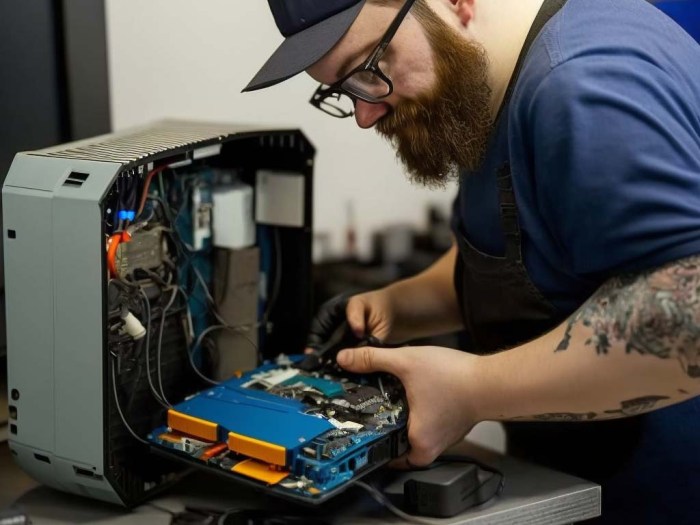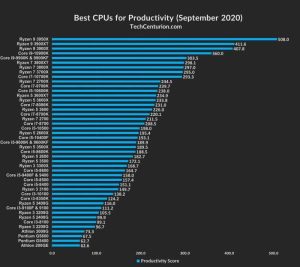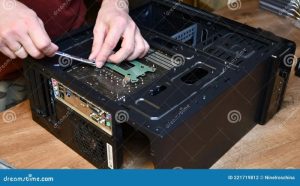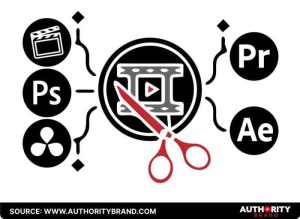
Dive into the world of Computer repair for gaming PCs, where we unravel common hardware issues, share performance optimization tips, highlight the importance of maintenance, and compare repair approaches with regular PCs. Get ready for a gaming experience like no other!
Computer Repair for Gaming PCs
When it comes to gaming PCs, there are a few common hardware issues that users may encounter. These can range from overheating due to intensive gaming sessions, to graphics card malfunctions, and even hard drive failures. Understanding these issues can help you troubleshoot and address them effectively.
Optimizing Gaming PC Performance
Optimizing your gaming PC’s performance is crucial for a smooth gaming experience. Here are some tips to help you get the most out of your system:
- Regularly update your graphics card drivers to ensure compatibility with the latest games.
- Clean your PC’s components, such as the fans and heat sinks, to prevent overheating.
- Manage your storage space effectively by uninstalling unused programs and games.
- Consider upgrading your RAM or storage drive for faster load times and better overall performance.
Importance of Regular Maintenance
Regular maintenance is key to keeping your gaming PC running smoothly and extending its lifespan. By performing routine tasks such as cleaning, updating software, and monitoring temperatures, you can prevent potential hardware issues and ensure optimal performance.
Differences in Repair Approach
Repairing gaming PCs can be quite different from regular PCs due to the high-performance components and specialized hardware commonly found in gaming rigs. When troubleshooting issues with a gaming PC, it’s important to consider factors such as overclocking, cooling solutions, and compatibility with gaming peripherals. Seeking professional help from technicians experienced in gaming PC repair may be necessary for more complex problems.
Electronics and Electrical in Computer Repair
When it comes to repairing gaming PCs, understanding the role of electronics and electrical components is crucial. These components play a significant role in the overall performance and functionality of gaming PCs.
The Role of Electronics in Repairing Gaming PCs
Electronics in gaming PCs consist of various components such as motherboards, graphics cards, RAM, and processors. These components work together to ensure smooth gameplay and optimal performance. Repairing gaming PCs often involves troubleshooting and replacing faulty electronic components to restore the system’s functionality.
Impact of Electrical Components on Gaming PC Performance
Electrical components like power supplies, capacitors, and resistors are essential for providing the necessary power and ensuring stable operation of gaming PCs. Issues with electrical components can lead to system failures, performance degradation, and even hardware damage. It is important to regularly check and maintain these components to prevent any potential issues.
Common Electrical Issues in Gaming PCs
1. Overheating
Inadequate cooling or dust buildup can cause electrical components to overheat, leading to system instability and performance issues.
2. Power Surges
Sudden spikes in electrical power can damage sensitive components like motherboards, graphics cards, and storage devices.
3. Short Circuits
Faulty wiring or damaged components can result in short circuits, causing the system to malfunction or fail.
4. Capacitor Failure
Capacitors are prone to failure over time, which can result in power delivery issues and system instability.
Crucial Electrical Components for Gaming PCs
- Power Supply Unit (PSU): Responsible for providing power to all components in the system.
- Motherboard: Acts as the central hub connecting all components and facilitating communication between them.
- Graphics Card (GPU): Essential for rendering graphics and ensuring smooth gameplay.
- RAM: Provides temporary storage for data and plays a key role in multitasking and gaming performance.
- Processor (CPU): Handles calculations and instructions, influencing overall system speed and performance.
Computer Repair and Consulting

When it comes to maintaining and optimizing your gaming PC, seeking professional consulting services can make a world of difference. Not only can experts help troubleshoot any issues that arise, but they can also provide valuable advice on how to enhance performance and extend the lifespan of your gaming rig.
Benefits of Professional Consulting for Gaming PC Repair
- Access to expert knowledge and skills in diagnosing and fixing complex hardware and software issues.
- Customized recommendations for upgrades or modifications to improve gaming performance.
- Peace of mind knowing that your valuable gaming equipment is in capable hands.
Consulting Process for Gaming PC Troubleshooting
During the consulting process, experts will typically perform a thorough assessment of your gaming PC, identify any existing problems, and propose solutions to address them effectively.
Tips for Choosing the Right Repair Service for Gaming PCs
- Look for certified technicians with experience in repairing gaming PCs specifically.
- Read reviews and ask for recommendations from fellow gamers to find a reputable repair service.
- Inquire about warranty policies and turnaround times to ensure efficient and reliable service.
Importance of Ongoing Consulting for Maintaining Gaming PCs
Regular consulting sessions can help prevent potential issues before they escalate, ensuring optimal performance and longevity for your gaming PC.
Data Communication in Computer Repair

When it comes to diagnosing gaming PC issues, data communication plays a crucial role in identifying the root cause of the problem and finding the right solution. By analyzing data transfer, network connectivity, and system logs, technicians can pinpoint the issue and make necessary repairs.
Importance of Data Backup
- Backing up data before repairing a gaming PC is essential to prevent any loss of important files, game progress, or personal information.
- Regularly backing up data ensures that even if something goes wrong during the repair process, all valuable information is safe and can be restored easily.
Data Communication Tools in Gaming PC Repair
- Remote Desktop Software: Allows technicians to access the gaming PC remotely to diagnose and fix issues without being physically present.
- Data Recovery Software: Helps in retrieving lost or corrupted data from hard drives, ensuring that no information is permanently lost during repairs.
- Network Analyzers: Assist in analyzing network traffic and identifying any connectivity issues that may be affecting the gaming PC’s performance.
Tips for Ensuring Data Security
- Encrypt sensitive data to protect it from unauthorized access during repairs.
- Use secure data transfer methods when backing up or transferring files to prevent data breaches.
- Implement strong passwords and authentication measures to safeguard data during the repair process.
Computers E-Books
E-books play a crucial role in learning about gaming PC repair by providing in-depth knowledge, step-by-step guides, and troubleshooting tips that can help enthusiasts and professionals alike improve their skills in computer repair.
Popular E-Books on Repairing Gaming PCs
- “The Ultimate Gaming PC Repair Guide” by TechMaster
- “Gaming PC Maintenance and Troubleshooting” by Computer Geek Guru
- “Mastering Gaming PC Upgrades” by Hardware Pro
Benefits of Using E-Books for Self-Education in Computer Repair
- Convenient access to detailed information and tutorials anytime, anywhere.
- Cost-effective compared to traditional printed books or attending courses.
- Interactive features like videos, animations, and quizzes for enhanced learning.
- Regular updates to keep up with the latest technology and trends in the industry.
Tips for Effectively Using E-Books to Enhance Computer Repair Skills
- Take notes while reading to reinforce learning and retain important information.
- Set specific goals and dedicate focused time for studying e-books regularly.
- Practice hands-on exercises and apply the concepts learned from the e-books in real-world scenarios.
- Engage in online forums or communities to discuss topics, ask questions, and share experiences with other learners.
Graphics and Multimedia in Computer Repair
When it comes to gaming PC repair, graphics and multimedia components play a crucial role in delivering an immersive gaming experience. These components are responsible for rendering high-quality graphics, smooth animations, and realistic sound effects during gameplay.
Common Issues with Graphics Cards
- Overheating: Graphics cards can overheat due to dust build-up or inadequate cooling, leading to performance issues.
- Driver Problems: Outdated or corrupted graphics card drivers can cause display glitches, screen tearing, or crashes.
- Hardware Failure: Components on the graphics card, such as capacitors or VRAM, can fail over time, resulting in graphical artifacts or system instability.
Tips for Troubleshooting Multimedia Problems
When troubleshooting multimedia-related issues in gaming PCs, start by checking the graphics card drivers for updates and ensuring proper ventilation to prevent overheating.
- Monitor Connections: Verify that the monitor is properly connected to the graphics card and that the cable is in good condition.
- Testing Tools: Utilize benchmarking software like 3DMark to assess the graphics card’s performance and identify any potential issues.
- Software Settings: Adjust in-game graphics settings to optimize performance and reduce strain on the graphics card.
Multimedia Tools for Diagnosing PC Issues
Diagnostic tools can help identify and troubleshoot graphics and multimedia problems in gaming PCs efficiently.
- MSI Afterburner: This tool allows users to monitor and tweak graphics card settings, including fan speed and clock speeds, to optimize performance.
- GPU-Z: GPU-Z provides detailed information about the graphics card, such as temperature, memory usage, and GPU load, aiding in diagnosing hardware issues.
- HWiNFO: HWiNFO is a comprehensive system information tool that can monitor various hardware components, including the graphics card, to detect any anomalies.
Computers Hardware
When it comes to repairing gaming PCs, understanding the role of hardware components is crucial. Hardware components are the physical parts of a computer that you can touch and see, such as the processor, graphics card, memory, storage, and motherboard. These components work together to ensure your gaming PC runs smoothly and efficiently.
Importance of Quality Hardware
Quality hardware is essential for gaming PCs as it directly impacts performance, reliability, and longevity. Investing in high-quality components can prevent issues such as overheating, system crashes, and hardware failures. Opting for quality hardware also ensures compatibility with other components, allowing for seamless integration and optimal performance.
- Choose a reputable brand when selecting hardware components to guarantee reliability and performance.
- Look for components with good reviews and ratings from other gamers and tech enthusiasts to ensure quality.
- Consider the specifications of each hardware component carefully to meet the requirements of modern games and software.
Hardware Upgrades for Enhanced Performance
Upgrading hardware components can significantly enhance the performance of your gaming PC, providing a smoother gaming experience and better graphics quality. Some examples of hardware upgrades that can boost performance include:
- Upgrading the graphics card for improved visuals and faster rendering of graphics.
- Increasing the RAM capacity to allow for faster multitasking and smoother gameplay.
- Installing a faster SSD or expanding storage space for quicker load times and more storage capacity.
Maintaining and Cleaning Hardware Components
Proper maintenance and cleaning of hardware components are essential to ensure the longevity and performance of your gaming PC. Regular maintenance can prevent dust buildup, overheating, and hardware malfunctions. Here are some tips for maintaining and cleaning hardware components:
- Regularly clean dust and debris from fans, vents, and heat sinks to prevent overheating.
- Avoid smoking or eating near your gaming PC to prevent dust and debris buildup inside the components.
- Use compressed air to gently blow out dust from hard-to-reach areas inside the PC case.
Closing Notes
As we wrap up our journey through Computer repair for gaming PCs, remember to keep those hardware components in top shape, stay on top of maintenance, and seek expert consulting when needed. Your gaming rig will thank you with smooth and uninterrupted gameplay sessions!
Popular Questions
What are the most common hardware issues gaming PCs face?
Common hardware issues include overheating, GPU/CPU failures, and RAM issues.
How can I optimize my gaming PC’s performance?
Optimize performance by updating drivers, cleaning dust, managing startup programs, and adjusting in-game settings.
Why is regular maintenance important for gaming PCs?
Regular maintenance prevents overheating, extends lifespan, and ensures optimal performance.
What’s the difference in repair approach between gaming PCs and regular PCs?
Gaming PCs may require specialized components and expertise due to their high-performance requirements.




